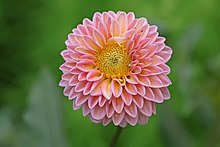dalia
Cebuano
[edit]Etymology
[edit]Pronunciation
[edit]- Hyphenation: da‧li‧a
Adjective
[edit]dalia
- exclamatory form of dali
Anagrams
[edit]Hungarian
[edit]Etymology
[edit]Borrowed from Serbo-Croatian delija (“brave man; hero, soldier; Turkish bodyguard”), from Ottoman Turkish دلی (deli, “mad, insane; the grand vizier's Bosnian or Albanian bodyguard”). Modern Turkish spelling is deli.[1] Doublet of deli.
Pronunciation
[edit]Noun
[edit]dalia (plural daliák)
Declension
[edit]| Inflection (stem in long/high vowel, back harmony) | ||
|---|---|---|
| singular | plural | |
| nominative | dalia | daliák |
| accusative | daliát | daliákat |
| dative | daliának | daliáknak |
| instrumental | daliával | daliákkal |
| causal-final | daliáért | daliákért |
| translative | daliává | daliákká |
| terminative | daliáig | daliákig |
| essive-formal | daliaként | daliákként |
| essive-modal | — | — |
| inessive | daliában | daliákban |
| superessive | dalián | daliákon |
| adessive | daliánál | daliáknál |
| illative | daliába | daliákba |
| sublative | daliára | daliákra |
| allative | daliához | daliákhoz |
| elative | daliából | daliákból |
| delative | daliáról | daliákról |
| ablative | daliától | daliáktól |
| non-attributive possessive - singular |
daliáé | daliáké |
| non-attributive possessive - plural |
daliáéi | daliákéi |
| Possessive forms of dalia | ||
|---|---|---|
| possessor | single possession | multiple possessions |
| 1st person sing. | daliám | daliáim |
| 2nd person sing. | daliád | daliáid |
| 3rd person sing. | daliája | daliái |
| 1st person plural | daliánk | daliáink |
| 2nd person plural | daliátok | daliáitok |
| 3rd person plural | daliájuk | daliáik |
Derived terms
[edit]References
[edit]- ^ dalia in Zaicz, Gábor (ed.). Etimológiai szótár: Magyar szavak és toldalékok eredete (‘Dictionary of Etymology: The origin of Hungarian words and affixes’). Budapest: Tinta Könyvkiadó, 2006, →ISBN. (See also its 2nd edition.)
Further reading
[edit]- dalia in Bárczi, Géza and László Országh. A magyar nyelv értelmező szótára (“The Explanatory Dictionary of the Hungarian Language”, abbr.: ÉrtSz.). Budapest: Akadémiai Kiadó, 1959–1962. Fifth ed., 1992: →ISBN
- dalia in Nóra Ittzés, editor, A magyar nyelv nagyszótára [A Comprehensive Dictionary of the Hungarian Language] (Nszt.), Budapest: Akadémiai Kiadó, 2006–2031 (work in progress; published a–ez as of 2024).
Italian
[edit]Pronunciation
[edit]Noun
[edit]dalia f (plural dalie)
Anagrams
[edit]Lithuanian
[edit]Etymology
[edit]From Proto-Balto-Slavic *dáljāˀ, from Proto-Indo-European *delh₁-. Cognate with Latvian daļa (“part, share”), Proto-Slavic *doľa (“share, fate”).
Noun
[edit]dalià f (plural dãlios) stress pattern 4
Declension
[edit]| singular (vienaskaita) | plural (daugiskaita) | |
|---|---|---|
| nominative (vardininkas) | dalià | dãlios |
| genitive (kilmininkas) | daliõs | dalių̃ |
| dative (naudininkas) | dãliai | dalióms |
| accusative (galininkas) | dãlią | daliàs |
| instrumental (įnagininkas) | dalià | daliomìs |
| locative (vietininkas) | daliojè | daliosè |
| vocative (šauksmininkas) | dãlia | dãlios |
Further reading
[edit]- “dalia”, in Lietuvių kalbos žodynas [Dictionary of the Lithuanian language], lkz.lt, 1941–2024
Polish
[edit]
Pronunciation
[edit]Etymology 1
[edit]Named after Swedish botanist Anders Dahl.
Noun
[edit]dalia f (related adjective daliowy)
Etymology 2
[edit](This etymology is missing or incomplete. Please add to it, or discuss it at the Etymology scriptorium.)
Noun
[edit]dalia f
- Alaska blackfish (Dallia pectoralis)
- Synonym: czarna ryba
Declension
[edit]Further reading
[edit]- dalia in Wielki słownik języka polskiego, Instytut Języka Polskiego PAN
- dalia in Polish dictionaries at PWN
Spanish
[edit]Pronunciation
[edit]Noun
[edit]dalia f (plural dalias)
Further reading
[edit]- “dalia”, in Diccionario de la lengua española, Vigésima tercera edición, Real Academia Española, 2014
Swahili
[edit]Etymology
[edit]Borrowed from Arabic دَالِيَا (dāliyā).
Noun
[edit]dalia (n class, plural dalia)
Welsh
[edit]Pronunciation
[edit]Verb
[edit]dalia
Mutation
[edit]- Cebuano terms suffixed with -a
- Cebuano non-lemma forms
- Cebuano adjective forms
- Cebuano exclamatory adjectives
- Hungarian terms borrowed from Serbo-Croatian
- Hungarian terms derived from Serbo-Croatian
- Hungarian terms derived from Ottoman Turkish
- Hungarian doublets
- Hungarian terms with IPA pronunciation
- Hungarian terms with audio pronunciation
- Rhymes:Hungarian/jɒ
- Rhymes:Hungarian/jɒ/3 syllables
- Hungarian lemmas
- Hungarian nouns
- Hungarian literary terms
- hu:People
- Italian 2-syllable words
- Italian terms with IPA pronunciation
- Rhymes:Italian/alja
- Rhymes:Italian/alja/2 syllables
- Italian lemmas
- Italian nouns
- Italian countable nouns
- Italian feminine nouns
- it:Composites
- it:Flowers
- Lithuanian terms inherited from Proto-Balto-Slavic
- Lithuanian terms derived from Proto-Balto-Slavic
- Lithuanian terms inherited from Proto-Indo-European
- Lithuanian terms derived from Proto-Indo-European
- Lithuanian lemmas
- Lithuanian nouns
- Lithuanian feminine nouns
- Polish 2-syllable words
- Polish terms with IPA pronunciation
- Polish terms with audio pronunciation
- Rhymes:Polish/alja
- Rhymes:Polish/alja/2 syllables
- Polish terms with homophones
- Polish eponyms
- Polish lemmas
- Polish nouns
- Polish feminine nouns
- pl:Coreopsideae tribe plants
- pl:Flowers
- pl:Pikes (fish)
- Spanish 2-syllable words
- Spanish terms with IPA pronunciation
- Rhymes:Spanish/alja
- Rhymes:Spanish/alja/2 syllables
- Spanish lemmas
- Spanish nouns
- Spanish countable nouns
- Spanish feminine nouns
- es:Composites
- es:Flowers
- Swahili terms borrowed from Arabic
- Swahili terms derived from Arabic
- Swahili lemmas
- Swahili nouns
- Swahili n class nouns
- Welsh terms with IPA pronunciation
- Welsh non-lemma forms
- Welsh verb forms
